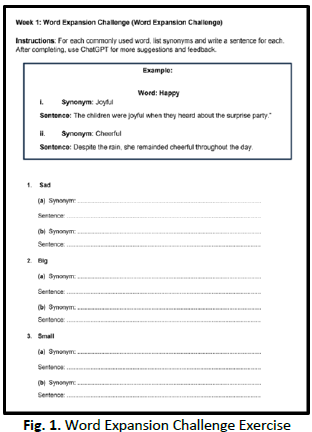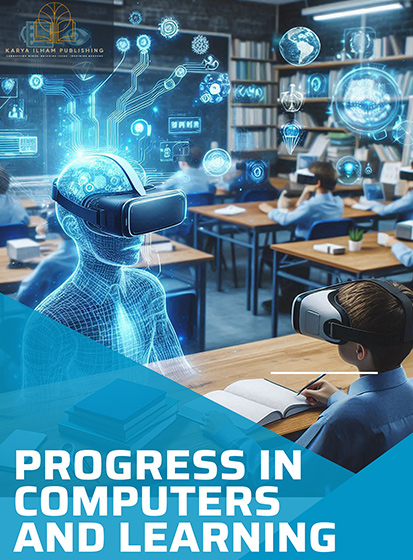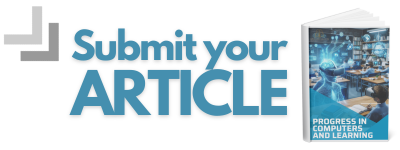AI-Driven Vocabulary Enhancement: Transforming Writing Skills for Secondary Students using ChatGPT
DOI:
https://doi.org/10.37934/picl.2.1.1228Keywords:
AI-driven learning, educational innovation, vocabulary mastery, ChatGPT, writing improvementAbstract
This innovation introduces a groundbreaking six-week educational module leveraging AI, specifically ChatGPT, to enhance vocabulary and writing skills among secondary school students. The module systematically tackles common challenges such as limited vocabulary, inappropriate word choices, spelling errors, and the inability to use nuanced or advanced vocabulary. Weekly activities include interactive exercises like synonym expansion, contextual fill-in-the-blanks, and advanced storytelling, all supported by ChatGPT’s personalized feedback. By program completion, students demonstrate a broadened vocabulary range, improved contextual accuracy, and greater confidence in expressive writing. This innovation redefines language learning by integrating AI into traditional teaching practices, fostering a future-ready approach for young learners
Downloads
References
[1] Ahmadi, Dr Mohammad Reza. "The use of technology in English language learning: A literature review." International journal of research in English education 3, no. 2 (2018): 115-125. https://doi.org/10.29252/ijree.3.2.115 DOI: https://doi.org/10.29252/ijree.3.2.115
[2] Campbell, Philippa. "Academic Writing Skills and Motivation for English Language Learners." TESOL Quarterly 42, no. 4 (2019): 682–704. https://doi.org/10.1002/tesq.42 DOI: https://doi.org/10.1002/tesq.42
[3] Kornfeld, L., & Roy, D. "Educational Implications of AI Writing Tools for Academic Writing." British Journal of Educational Technology 52, no. 1 (2021): 248–262. https://doi.org/10.1111/bjet. 12973
[4] Krajcik, Z., and K. Kim. "To what extent do AI writing tools improve writing quality." A case study of master’s level students. Educational Sciences 10, no. 11 (2020): 3-21. https://doi.org/10.3390/educsci10110321 DOI: https://doi.org/10.3390/educsci10110321
[5] Liu, J., & Xu, F. "AI-Assisted Learning Tools in Improving English Writing Skills." Journal of Educational Technology & Society 24, no. 1 (2021): 29-41. https://doi.org/10.2307/jeductechsoci.24.1.29
[6] Zhao, M. "The Role of ChatGPT in Writing Error Correction for EFL Learners." Second Language Writing Journal 10, (2022) :34-49. https://doi.org/10.1016/j.eflj.2022.01.003
[7] Nguyen, Thi Chi. "University Teachers’ Perceptions of Using ChatGPT in Language Teaching and Assessment." In Proceedings of the AsiaCALL International Conference, vol. 4, pp. 116-128. 2023. https://doi.org/10.54855/paic.2349 DOI: https://doi.org/10.54855/paic.2349
[8] Le Phan, Thi Ngoc. "Students' perceptions of the AI technology application in English writing classes." In Proceedings of the AsiaCALL International Conference, vol. 4, pp. 45-62. 2023. https://doi.org/10.54855/paic.2344 DOI: https://doi.org/10.54855/paic.2344
[9] Tseng, Waverly, and Mark Warschauer. "AI Writing Tools in Education: If You Can’t Beat Them, Join Them." Journal of China Computer-Assisted Language Learning 3, no. 2 (2023): 75–90. https://doi.org/10.1515/jccall-2023-0008 DOI: https://doi.org/10.1515/jccall-2023-0008
[10] Tülübaş, F., and Demirkol, S. "ChatGPT in Educational Contexts: Challenges and Future Directions." Education and Technology Journal 12, no. 3 (2024): 215–230. https://doi.org/10.22521/edupij.2024.132.7 DOI: https://doi.org/10.22521/edupij.2024.132.7
[11] Wei, Ling. "Artificial intelligence in language instruction: impact on English learning achievement, L2 motivation, and self-regulated learning." Frontiers in Psychology 14 (2023): 1261955. https://doi.org/10.3389/fpsyg.2023.1261955
[12] Huang, X. "Enhancing Academic Writing Skills Through AI Tools." Frontiers in Psychology 14 (2023): 1261955. https://doi.org/10.3389/fpsyg.2023.1261955 DOI: https://doi.org/10.3389/fpsyg.2023.1261955
[13] Seufert, A. et al. "AI-Powered Writing Tools and Motivation." Journal of Educational Psychology 114, no. 3 (2021): 553-567. https://doi.org/10.1037/edu0000645 DOI: https://doi.org/10.1037/edu0000645
[14] Salvagno, A., & Yoon, A. "Personalized Feedback and Writing Accuracy in AI-Assisted Tools." Language and Education 37, no. 3 (2023): 212-227. https://doi.org/10.1080/09500782.2023.2122124
[15] Meunier, F., & Lee, S. "AI-Assisted Writing: Enhancing EFL Student Motivation." Language Learning & Technology 27, no. 2 (2022): 45-64. https://doi.org/10.1016/j.edtech.2022.07.004
[16] Hwang, S. et al. "AI-Enhanced Learning Environments in Writing Skills." Educational Technology & Research Journal 27, no. 1 (2023): 1-12. https://doi.org/10.1007/s11423-023-10074-3
[17] Wu, X. "Contextual Vocabulary Mastery through AI Technologies." TESOL Quarterly 41, no. 4 (2021): 501–515. https://doi.org/10. 1002/tesq.41
[18] Kornfeld, L., and D. Roy. "Educational implications of AI writing tools for academic writing." British Journal of Educational Technology 52, no. 1 (2021): 248-262. https://doi.org/10.1111/bjet.12973 DOI: https://doi.org/10.1111/bjet.12973
[19] Wu, S., & Tan, Z. "Leveraging AI to Enhance Academic Writing in Higher Education: Benefits and Challenges. " Higher Education Studies 32, no. 2 (2202): 89-103. https://doi.org/10.1007/s11092-022-09485-7
[20] Algerafi, M., et al. "Artificial Intelligence in Education: Opportunities and Ethical Considerations." Journal of Educational Technology 28, no. 4(2023): 45-61. https://doi.org/10.1007/s11423-023-10074-3















